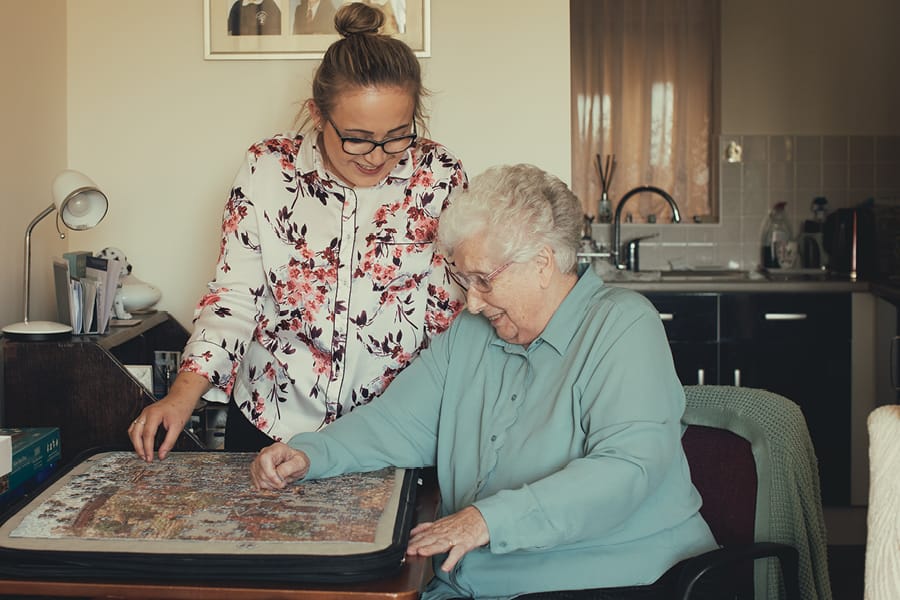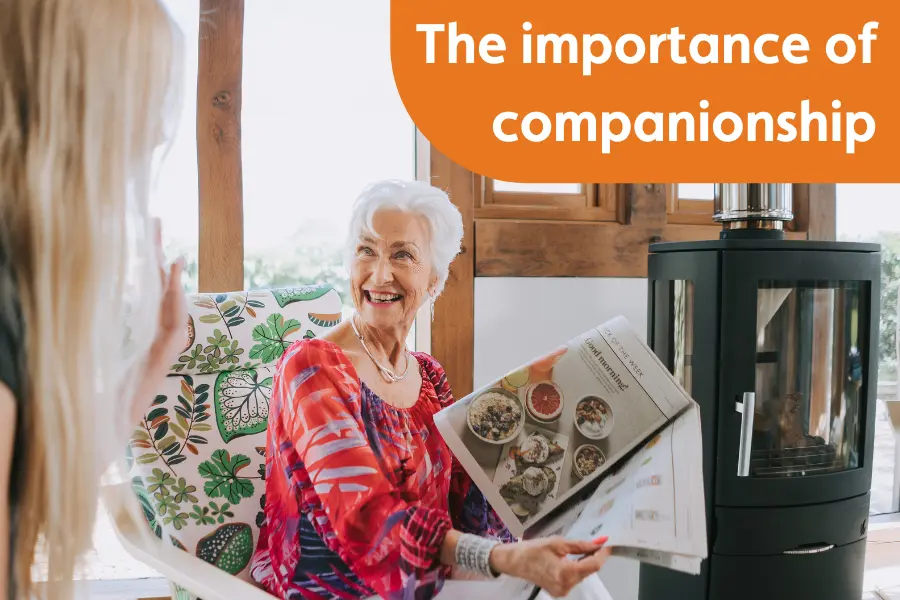Valentine’s Day is often associated with romance, but companionship, care, and human connection are just as important – especially for the elderly. For many, this time of year highlights loneliness or social isolation, making it the perfect moment to discuss why companionship matters year-round.
As we age, social circles naturally shrink. Loved ones may move away, mobility can become limited, and the loss of a spouse or close friends can leave a significant void. While families do their best to provide support, it’s not always possible to be there every day. That’s why consistent companionship, whether through family, friends, or professional caregivers, is essential for emotional and physical wellbeing.
Companionship is not just a ‘nice-to-have’. It plays a critical role in maintaining independence, cognitive health, and overall happiness.


The Importance of Companionship in Later Life
A strong support network and regular social interaction can make a world of difference to an older adult’s health and wellbeing. Yet, loneliness remains a widespread issue, particularly among those living alone or experiencing health challenges.
According to Age UK, over 1.4 million older adults in the UK often feel lonely. This isn’t just an emotional issue, it’s a public health crisis.
Loneliness isn’t just about feeling isolated—it has significant health consequences. Studies show that social isolation can accelerate dementia and memory loss, increase the risk of depression and anxiety, and contribute to physical health issues such as high blood pressure and heart disease. Older adults who feel socially disconnected often also become less mobile and independent, leading to frailty and an increased risk of falls.
The Benefits of Companionship for Older Adults
Regular social interaction fosters a sense of purpose, promotes mental stimulation, and helps maintain a positive outlook. Some key benefits include:
- Encouraging conversation and engagement – Keeping the mind active and helping prevent cognitive decline.
- Providing routine and structure – A set schedule for visits or activities brings stability, particularly for those with dementia.
- Supporting physical activity and hobbies – Engaging in pastimes like reading, music, or puzzles helps with overall wellbeing.
- Reducing anxiety and depression – Meaningful social interactions boost mood and emotional resilience.
- Promoting a sense of purpose – Participating in social activities fosters self-worth and motivation.
Even small, regular interactions can make a huge difference in an older person’s daily life.


Supporting Companionship for an Older Loved One at Home
Katie, our Registered Manager, oversees our Solihull service, working closely with adults to provide personalised companionship care. With years of experience in the home care sector, she understands how even small interactions can have a big impact on emotional and physical wellbeing.
“Companionship isn’t just about having someone there, it’s about feeling truly connected to the people around you. A thoughtful routine, engaging conversations, and meaningful activities can make all the difference in an older person’s day.”
Here, Katie shares her insights on how families can foster companionship for their loved ones:
1. Schedule regular phone or video calls
“Even a short chat can brighten an older person’s day and reinforce a sense of connection. It doesn’t have to be a long call. Just a quick check-in can make them feel valued and remembered. If possible, try to set a regular time for calls, as something to look forward to can be just as meaningful as the conversation itself.”
2. Encourage reminiscing
“Looking through old photos, listening to familiar music, or chatting about past experiences can bring joy and comfort. Reminiscing isn’t just about nostalgia – it’s a great way to stimulate memory, boost mood, and spark meaningful conversations.”
3. Create a structured routine
“A predictable routine can be very reassuring for older adults, especially those with dementia. Regular activities—like a set day for visits, meals at the same time, or a planned afternoon walk—help create a sense of stability and something to look forward to.”
4. Use technology to stay connected
“Technology can be a great tool to bridge the gap when loved ones can’t always visit in person. Video calls, voice assistants, and social apps help maintain connection, and even simple tools like WhatsApp voice notes can make someone’s day. If technology feels overwhelming, taking the time to introduce it slowly and patiently can really help.”
5. Support participation in community activities
“Memory Cafés, social clubs, and day centres are fantastic ways to bring more social interaction into an older person’s life. Finding a local group that matches their interests, whether that’s music, arts, or simply a coffee morning, can provide a renewed sense of belonging.”
6. Engage them in hobbies they love
“Encouraging older adults to continue their favourite hobbies is a great way to keep their mind and hands active. Whether it’s knitting, gardening, baking, or painting, engaging in activities they enjoy brings joy and a sense of achievement. If they’ve stopped doing something they used to love, gently reintroducing it might rekindle their passion.”
7. Encourage light physical activity
“Staying physically active, even in small ways, can have a huge impact on wellbeing. A short walk, chair exercises, or stretching can help maintain mobility and boost mood. It doesn’t have to be anything strenuous – just moving a little every day can make a difference.”
8. Arrange for regular visits
“Visits from family, friends, or volunteers can be a real highlight of the week. If regular visits aren’t possible, even a quick doorstep chat or dropping off a handwritten note can make an older person feel thought of and cared for.”
9. Be aware of signs of isolation
“It’s not always obvious when someone is feeling lonely. If they start withdrawing from conversations, declining invitations, or losing interest in things they used to enjoy, it may be a sign they need more social support. A small effort to engage them could make all the difference.”
10. Consider professional companionship care
“If an older loved one is feeling increasingly isolated, companionship care can provide that much-needed social interaction. A Caregiver can help with daily activities, accompany them on outings, or simply be there for a friendly chat. Sometimes, knowing someone is coming for a visit can be enough to lift their spirits.”


How Home Care Provides Essential Companionship
For families who can’t always be there, professional home care services offer vital companionship and support. A Caregiver can provide social interaction, emotional support, and engagement beyond physical assistance.
A trained Caregiver becomes a familiar friendly face, engaging in friendly conversation, reminiscence, and hobbies, which helps older adults maintain an active and fulfilling daily routine. They can encourage participation in hobbies and outings, assist with light tasks, and offer emotional support, ensuring that older adults feel valued, supported, and included. In cases where dementia is a factor, routine companionship can reduce anxiety and provide essential reassurance.
For some older adults, a little extra support during the day can make all the difference. Whether it’s companionship, help with meal preparation, light housekeeping, or assistance with appointments, having flexible care options helps maintain independence and wellbeing. Our Off-Peak Package provides 2.5 hours of care for £75 between 10 am and 4 pm, offering practical support and meaningful engagement when it’s needed most.
Good care isn’t just about physical support—it’s about improving quality of life through meaningful human connection.
A Little Connection Goes a Long Way
Love comes in many forms, including companionship, care, and simply being present in someone’s life. As we move beyond Valentine’s Day, it’s important to remember that staying socially connected is essential for happiness and health at any age. A small conversation, a shared memory, or a helping hand can make all the difference.
If you’re wondering how to introduce more social connection into a loved one’s daily routine, our friendly team is always here to offer guidance and support. Get in touch with us to find out more.
With over 40 years of experience in the care industry, providing outstanding care has always been Helena’s core mission.
Helena has been a dedicated member of Unique Senior Care for eight years, starting as Care Manager and advancing to Head of Extra Care and now serving as Director of Operations.
She holds a Level 5 Diploma in Leadership for Health and Social Care and Children and Young People’s Services (England), as well as a Diploma in Welfare Services. Helena has completed various leadership and management courses, enhancing her expertise in the care industry.
Helena has authored published articles, including one for Skills for Care on managing change through the COVID pandemic. She has a steadfast commitment to advocating for and supporting those in need, ensuring their voices are heard and their rights upheld.



